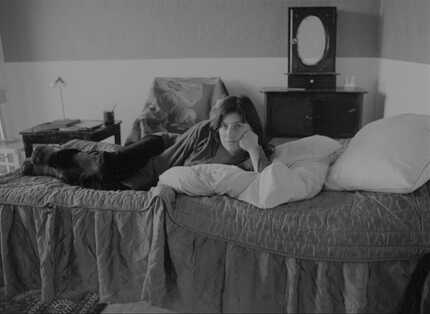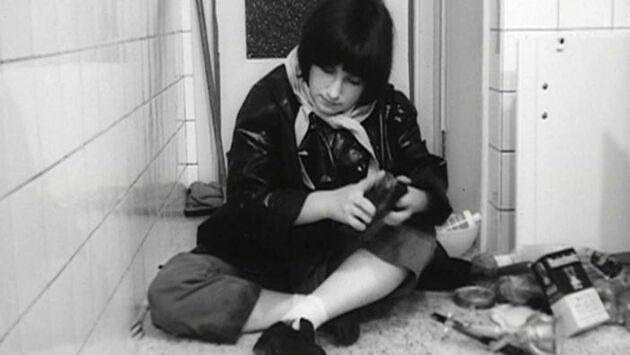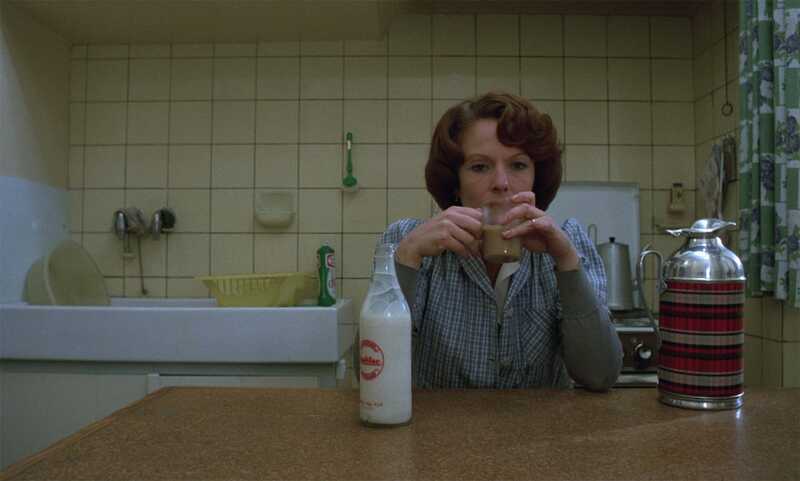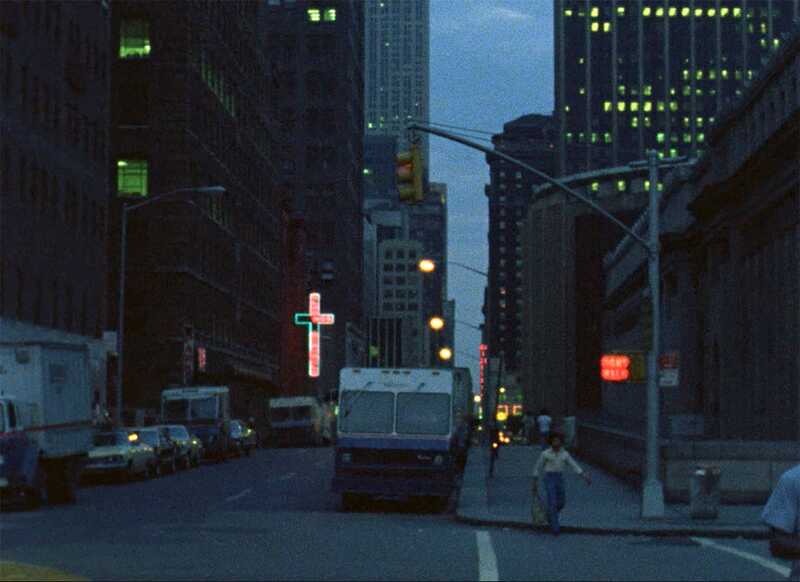CHANTAL AKERMAN Blu-ray Review: Criterion Showcases Early Masterworks

Chantal Akerman left us far too soon. Her work was singular and extraordinary; certainly, it's an incredible achievement to have made one of the greatest films of all time at the tender age of 25. (Jeanne Dielman, 23, Quai du commerce, 1080 Bruxelles topped the 2022 Sight & Sound poll). Both the amount and range of her filmography showcases the extent of her talents, and her influence still extends to this day.
Criterion have issued a new box set, feature nine of her early works - shorts, features, fiction, and documentary - along with footage from uncompleted films, interviews with Akerman and others, highlighting her early formation and development of her signature style and thematic ideas. It's also a time capsule for a revolutionary era in art and film, particularly for those, like Akerman, who were usually kept on the margins of cinema.
Given that this set covers just a decade in her more than 40-year career, it allows for a more detailed examination. In the booklet essay by writer and critic Beatrice Loayza - which, in a rare exception, I would recommend reading before embarking on your audiovisual journey (usually I say just read it when you want to), a thorough journey through the past of Akerman's grandmother (a painter whose work was never showcased since she was a woman, and who died at Auschwitz), her parents (both scarred from the Holocaust) who were less concerned about her school grades and more about what kind of nice Jewish boy she would marry, and her own early observation that a life of domesticity was most definitely not for her. It's an insightful peek into the mind and heart of the artist, and so important to understanding what art influenced her, how she took that influence and incorporate it into her own perspective, and how that exploded on the screen.
Akerman's early years in Brussels, Paris, Israel, and New York, seem like a kind of starving artist's feverdream (she got the money for two of her early films, by working as a ticket taker at a porn theatre, for example, or walking the streets all night when she had nowhere to sleep). If her childhood years were marked as a child of Holocaust survivors, watching how forced domesticity can kill a woman's spirit, her early 20 saw a focused rebellion and determination to strike against these forces, by showcasing them to a wider audience.
Her first two complete shorts, made a few years apart, nonetheless both examine the place of a woman in the home, and how perhaps the home is not, or should not, be a woman's place. Saute ma ville ('Blow Up My Town') shows a woman (Akerman) making a mess of her kitchen. In a nod to comedic figures such as Chaplin and Tati, Akerman's character contrasts the drab monotony of a owman's domestic duties with a constant cherry humming, accompanied by anti-domestic behaviour, such as throwing the contents of the pantry on the floor, and throwing the act outside. Akerman is announcing her life and cinematic rebellion with a literal bang at the end. It's an oddly joyous film, considering its somewhat minimalist nature and rough qualities. In L'enfant aimé ou je joue à être une femme mariée ('The Beloved Child, or I Play at Being a Married Woman'), a young mother (Claire Wauthoin), as the title says, tries to play at married life: she tries on dresses, plays with her child, while conversing on these subjects with a friend (Akerman); perhaps in playing these games, she can convince herself that she is happy and that this life if fulfilling, even as her constant scrutiny of herself in mirrors shows that she ia barely more than a child herself. In both these shorts, we can see her ideas and techniques already emerging.
Her first New York film, La Chambre, Akerman stays in the domestic domain, this time with the camera slowly circling a small studio apartment. There's a woman on the bed, and with each circle, something, or a few things change. It's the slow rise of morning, and we think about how this woman might be a part of the space, how she engages with it - but this feels also like something of an exercise for Akerman, testing theories and styles which could be utilized (and will be) in later films. It's an exploration of the space right after liminal space, and it seems then she takes a step back into the liminal with her next film, a mid-length documentary Hotel Monterey. A silent film, Akerman places herself/the camera in various spaces around this budget hotel: watching older ladies in their finery, perhaps before going to the theatre; inside the elevator, watching its constant journey and the points of people's stories that it is briefly the star; sometimes opening on an empty floor, as if letting in or letting off a ghost. Each person who passes by the camera has a story, but so does each space. It feels like the original 'the back rooms'.
Returning to Europe, and to the imagery of the woman in the home, 15/8 is her only co-directed film (with Samy Szlingerbaum). The main character is a young woman, Finnish actress Chris Myllykoski, narrates her everyday life. She mirrors much of Akerman's position: a foreigner navigating in a different language (as Akerman navigated New York), a woman who is not comfortable with the expected domesticity that comes with her gender, trying to find a home among friends, leaving a sense of disconnection from stablility.
Her first feature, Je tu il elle, marks the culmination of her previous work, the exponential growth of her skill, and a refining of her thematic choices. Once again putting herself in front of the camera, Julie is a young woman who puts herself in isolation after leaving an unhappy relationship. She takes the ennui we all have after such an event, and distills it into its essentiallity: the eating of sugar straight out of the bag, not dressing properly, staying indoors and watching the world pass by. Following this with a second act that's a road movie where you don't see the road also feels so true to life as to be eerie - again, stripping away the 'small talk' of these transitional days, examining that time when we start to put ourselves out into the world again, but haven't quite figured out what it is we want. And finally, the third act reunion with an ex-girlfriend, with a love-making scene of several minutes, breathtakingly honest and deceptively complex in its presentation, so raw in showcasing these women (Akerman and Waution). The film's poetic honestly has lost none of its power.
Perhaps because Sight & Sound's poll happens every 10 years, that we had to wait a while for more people (beyond cinephiles) to be aware of the greatness of Jeanne Dielman, 23, Quai du commerce, 1080 Bruxelles. And I don't know that Akerman ever got past the pressure that came from making this masterpiece at the age of 25. But a masterpiece it is, and despite it being nearly 50 years old, it's amazing how little it has aged. The techniques Akerman used, a low-angle still camera, characters walking in and out of frame, the framing of those tight spaces, still feel fresh and inventive. And how the story - a widowed housewife whose ordered life includes prostitution, whose world unravels as soon as her precision collapses, also feels fresh, relevant, and haunting today. It remains French actress Delphine Seyrig's finest performance.
I fully admit that my favourite of Akerman's films is News from Home, her study in a kind of experimental biographical documentary. Over various shots of New York City, Akerman reads letters from her mother, that she received in her first years of living in the city, an ocean away from her family. She was so young at the time, it's not surprising that her mother would write often, and her letters would include not only the somewhat mundanity of their daily lives, but also concern for her daughter. The mediation on the spaces Akerman is inhabiting: the streets of 1970s New York, those filled with people and empty, subway platforms, subways: it's clear that this was a kind of guerilla filmmaking, which people, especially on the subway, often staring into the camera for several minutes. While it is distinctively New York, Akerman avoids obvious landmarks - this is the city as she lived in it, not as tourists see it. And these letters are both her lifeline to her past life, and perhaps a noose around her beck. To have them read in her own voice, usually in a neutral tone, asks us to listen between the lines, as we search the streets for the clues of what the words mean to the speaker.
The last film in the collection, Les rendez-vous d'Anna, also feels like Akerman exploring her own recent existent through the cypher of the main character. In this case, Anna (Aurore Clément) is a filmmaker, who family live in Brussels, while she is traveling in Europe with her new film. In each place she visits, she becomes briefly a part of the landscape, but only in temporary spaces: train stations, hotels. As a contrast to Jeanne Dielman, this is the working woman's life: one in which almost everyone she encounters, seems to want her to choose a different existence, one that would leave Anna at their beck and call. This is a film filled with monologues - some from Anna, but also from these others in her life We are hearing both the day to day noticings, and their innermost pain and needs, and the camera lingers on them. It lingers on Anna to - the precision with which Akerman moves her story, the precision with which she has her actors relate their characters, belies the turmoil underneath. It's hauntingly subtle and yet seething with longing and heartache beneath the precision.
Special Features
All the work in the blu-ray was restored with the Cinematek in Belgium (with the exception of Le 15/8), and the work is outstanding. It keeps the warmth and grain of the print film, while maintaining the quality. We're treated to some rarely seen work by Akerman. First, three film tests she did for her application to film school. The first shows scenes from a carnival, the second some domestic scenes including a residential courtyard, a woman brushing her hair, and the third tells a story of a woman in a seaside town. While they might be just tests, they already show both Akerman's narrative interests and how she's already exploring her signature style. There is also footage from her unifnished documentary Hanging Out Yonkers - while the sound did not survive, we see footage of young people in some kind of community centre, and I can imagine Akerman wanted to showcase these teens and their lives.
For those who want a more general introduction to Akerman and her work, film historian and theorist B. Ruby Rich provides an excellent overview in a 20-minute interview. Perhaps the most important point that she makes, is how Akerman hated labels such as 'woman filmmaker' or 'lesbian filmmaker' or 'Jewish filmmaker'. Even though her work was, at least in part, a reflection of these identities, she wanted to be known as a filmmaker, full stop. Rich also points out how Akerman rejected anything but the art - she was focused on the art of making stories through film, even as her stories were personal and political. There is also an interview with cinematographer Babette Mangolte, from 2009, with whom Akerman worked on several films, including Jeanne Dielman. She discusses how Akerman was inventing a new kind of language of film, since the stories she was telling had not been told before, and the opportunities this presented to those she worked with.
Akerman's own reflections on her work as equally compelling, and there are interviews from three difference decades on the discs, so we can listen to the progression of her thoughts on her work. In a series of exceprts from the 1970s, there is a brief telephone inteview with another great filmmaker, Agnès Varda, who was an admirer of Akerman's and thought she should be judged on her own terms. At this point in time, Akerman felt that the absence of culture was her strength, how she educated herself in the filmic arts, the importance of her Jewish identity and how it affected her work, and how much more at home she felt in New York than Brussels. In a television spot from 1987, which she was meant to direct on a filmmaker she admired, she instead turned the camera on herself, examining her own work and how she felt about it, if she achieved her goals, and how she would present herself, if tasked. In another from 2009, she talks about the influence of avant garde filmmakers such as Michael Snow, and the importance of centering ritual in her stories.
There is a fantastic reel of behind the scenes footage, shot during the making of Jeanne Dielman and edited by Akerman. For anyone interested in director-actor communication, this is fascinating. To watch someone of the experience and calibre of Seyrig, converse with and often challenge a still-newish director like Akerman, to make sure she explains what she wants from her actor, and more importantly, why, so Seyrig has the full understanding of her character's actions. It aslo shows how actor needs to understand technical direction, and how a director must make decisions that seem innocuous, but can make all the difference in a show. To watch this back-to-back with an excerpt from French television show during the film's press junket, and it is comical yet not surprising to watch the male host ask Seyrig and Akerman questions and then constantly interrupt their intelligent answers with silly comments.
By far, the most interesting special feature in an interview with Akerman's mother, Natalia. We have already heard her words in News from Home, and we're aware of how Natalia's life as a housewife was an influence on the kinds of stories Akerman decided to tell. But to hear how her mother speaks of the father's concern over Akerman's career choice, what Natalia thought of Akerman 'blowing up the kitchen' in her first short - in short, this quiet and steadfast support of her daughter, is of one the most intimate works Akerman made. In one part of the conversation, when Akerman asks about the orderliness and ritual that her mother insisted upon, Natalia ruminates that this was likely due to her time spent in a Nazi concentration camp, when any deviation from the schedule meant death was coming, so ritual and order kept the trauma at bay (as much as was possible). It also ends with Natalia saying to the cameraperson, of her great admiration for her daughter. This is the perfect supplement on which to conclude your viewing.
Saute ma ville
Director(s)
- Chantal Akerman
Cast
- Chantal Akerman
L'enfant aim� ou je joue � �tre une femme mari�e
Director(s)
- Chantal Akerman
Writer(s)
- Chantal Akerman
Cast
- Chantal Akerman
- Daphné Merzer
- Claire Wauthion
La chambre
Director(s)
- Chantal Akerman
Writer(s)
- Chantal Akerman
Cast
- Chantal Akerman
Hotel Monterey
Director(s)
- Chantal Akerman
Writer(s)
- Chantal Akerman
Le 15/8
Director(s)
- Chantal Akerman
- Samy Szlingerbaum
Writer(s)
- Chantal Akerman
- Samy Szlingerbaum
Cast
- Chantal Akerman
- Chris Myllykoski
- Samy Szlingerbaum
Jeanne Dielman, 23, quai du commerce, 1080 Bruxelles
Director(s)
- Chantal Akerman
Writer(s)
- Chantal Akerman
Cast
- Delphine Seyrig
- Jan Decorte
- Henri Storck
News from Home
Director(s)
- Chantal Akerman
Writer(s)
- Chantal Akerman
Cast
- Chantal Akerman










